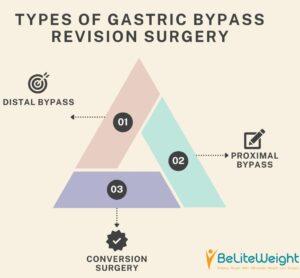Introduction
Did you previously go through Gastric bypass revision? Did you regain weight right now? Are you dealing with any surgical complications? If yes, this blog will be absolutely for you.We will explain and go deep about how gastric bypass revision can help you get back your health.
Gastric bypass revision surgery is a procedure some in our native communities may need. This is because they initially had weight loss surgery but regained significant weight or developed complications. Also, a revision can help get them back on the path to health.
This expert blog will explore the reasons one might need a gastric bypass revision. Moreover, it covers the different revision procedures available. Instead, it looks at what to expect from the surgery and recovery process. We'll dive into the potential risks and benefits. Because of this, you can make an informed decision about pursuing this option in your personal journey towards wellness.
What is Gastric Bypass Revision Surgery?
Gastric Bypass Revision surgery is a procedure to correct or modify a previous gastric bypass surgery. It is often done to address complications, insufficient weight loss, or weight regain. This surgery can involve adjusting the size of the stomach pouch, repairing any issues with the original surgery, or converting the gastric bypass to another type of bariatric procedure.
The question is quite common to people who already has gained more than their optimal health. Also, an if you are an individual who when through weight loss surgery previously can ask this question. Following are the situations when you can opt for gastric bypass revision:
Weight RegainYou must be wondering about ' Gastric bypass revision near me' for weight regain. This can happen if the stomach pouch or stoma gets stretched out over time.
ComplicationsYou may need it for complications from the original surgery. These include stomach leaks, hernias, ulcers, or bowel obstructions.
Inadequate Weight LossA revision may be required if you had inadequate weight loss after the first bypass. Instead, it can enhance weight loss by further restricting calories.
Nutritional DeficienciesNutritional deficiencies are another reason. You may develop severe deficiencies that supplements alone cannot manage. Because of this, a surgery to change the digestive tract configuration may be advised.
Your bariatric surgeon will evaluate your situation. Moreover, they will recommend if a revision is appropriate based on your weight, nutrition, health, and goals. Maintaining follow-up care is important. This helps monitor potential issues.

Pouch Revision In this procedure, the Gastric bypass revision surgeons makes the stomach pouch smaller. This is to restrict food intake. Moreover, it may involve removing part of the stretched stomach pouch. Instead, it can be done by adding a ring or band around the pouch outlet.
Because the initial pouch has become enlarged over time, decreasing its size can help induce further weight loss. Also, it can restore the feeling of fullness and portion control that may have been lost. Moreover, a pouch revision does not reroute the intestines like some other revisions.
Distal Bypass
This revision leaves the original pouch in place. Instead, it surgically reroutes a longer portion of the intestines. This is to decrease calorie and nutrient absorption. Moreover, by bypassing more of the small intestine, it enhances weight loss and reduces absorption of fats and sugars.
A distal bypass may be recommended if weight loss has plateaued or if the patient struggles with high blood sugar or complications related to absorption. However, it increases the risk of nutritional deficiencies compared to other revisions.
Proximal Bypass
Instead of bypassing more intestine, a proximal bypass shortens the intestinal limb and common channel where absorption occurs. This revision may improve weight loss. Moreover, it reduces nutritional complications compared to a distal bypass.
The proximal approach still decreases absorption to an extent. However, it preserves more intestinal length for nutrient uptake compared to a distal bypass. Also, it can provide a balanced approach for enhanced weight loss with less risk of deficiencies.
Conversion Surgery
For patients who had adjustable gastric banding or sleeve gastrectomy initially, a conversion revises their anatomy to a Roux-en-Y gastric bypass. Moreover, this more complex metabolic procedure typically induces greater weight loss than restrictive bands or sleeves.
Conversion may be advised if significant weight regain occurs or if complications develop from the original surgery. However, it requires more extensive intestinal rerouting compared to revising a prior gastric bypass.
Gastric bypass revision costs can vary significantly. Moreover, these costs depend on several factors. Also, these factors include the type of revision procedure needed. Moreover, they include your geographical location. Also, they include surgeon's fees. Moreover, they include hospital facility fees. Also, they include whether any complications arise. The gastric bypass revision cost stays between $25,000-$35,000. But you can find it in much low at BeLiteWeight. You may contact the experts for more about gastric bypass revision.
Endoscopic gastric bypass revision is a minimally invasive procedure. It revises or repairs a prior gastric bypass surgery.
During the time of endoscopic revision, the surgeon keep an endoscope down the esophagus. It also penetrates the stomach pouch and intestine. One should also know that an endoscope is a long, flexible tube that contains a camera. Furthermore, small instruments inserted through the endoscope enable the doctor to perform changes or repairs.
Some common reasons for an endoscopic Gastric bypass revision surgery include stomach pouch expansion or stretching over time.
This reduces restriction. Also, it includes widening of the stoma from the pouch into the intestines. Moreover, it includes twisting, kinking or obstruction of the intestinal limbs. Furthermore, it includes leaks or fistulas at the stomach and intestine connections.
The endoscopic approach aims to recreate a smaller stomach pouch, narrow the stoma, reposition or reconnect intestinal limbs, or repair any leaks. This is all from inside the body without major incisions.
Following your doctor's post-surgical recommendations is critical. This is because any surgical procedure necessitates meticulous attention and adherence to the specified protocols. Moreover, these come from your healthcare provider.
The typical recovery timeline often involves a short hospital stay of 1-3 days. This ensures there are no immediate complications. Moreover, you'll start with a liquid diet. Also, it gradually transitions to pureed and then solid foods over several weeks. Because this allows your revised stomach and intestines to heal properly. Strenuous activity and heavy lifting will be restricted for 4-6 weeks. This is to avoid straining the surgical area as it recovers.
Throughout the healing process, you will need constant support and monitoring. This originates with your bariatric surgeon, dietician, and other medical team members. Because rebuilding strength and adapting to new alterations in your digestive system takes time. Moreover, attending support group meetings can provide valuable encouragement and advice. This is from others who have undergone similar revision procedures. Having this continued support system in place can greatly increase your chances of long-term success. This is after revision surgery.
For Native American communities, cultural identity plays a vital role in personal health decisions. This is true for overall well-being as well. Because traditional beliefs, values, and practices have shaped indigenous ways of life for generations. Any major healthcare choice should be considered through a cultural lens. This includes undergoing gastric bypass revision surgery.
One potential concern is the integration of conventional medical procedures with traditional Native healing practices. Moreover, there may be dietary considerations based on indigenous foods and cultural foodways. These could affect nutritional needs after revision surgery. It's important to have open dialogue with healthcare providers about maintaining cultural traditions. This is during the treatment and recovery process.
To help navigate these concerns, tribal healthcare centers or Native liaison services at hospitals can provide guidance. Also, they may connect you with Native American support groups. These are specifically for those undergoing bariatric surgery revisions. Having advocates who understand both your cultural background and this specialized surgery can ensure your needs are fully addressed. Ultimately, the goal is achieving improved health while respecting your cultural identity as a Native American.
Gastric Bypass Revision Before And After
The different revision options each have their own advantages and considerations. These are pouch reduction, distal bypass, proximal bypass, or conversion surgery. By understanding the reasons someone may need a revision and the various procedures available, you can make an informed decision. Moreover, this is alongside your bariatric surgeon about the best path forward.
The road after any weight loss surgery is a lifelong journey. Moreover, revision demonstrates the commitment to reclaiming your health despite setbacks. With this detailed expert guidance on gastric bypass revisions, our Native American community can pursue this option. This is from a place of empowerment and cultural respect.
Undergoing revision surgery is not an easy choice. However, it provides an opportunity to renew your efforts toward sustainable weight management and improved well-being. By following your surgeon's postoperative plan diligently and seeking support resources, you give yourself the best chance at long-term success. This is after a gastric bypass revision.
Prioritizing your health is an act of self-love. Don't hesitate to explore a revision if it could help you achieve your wellness goals. Moreover, this is while honoring your Native traditions. You've displayed immense strength already. Moreover, revision surgery can be the next step that puts you back in control of your journey.
- What causes weight regain after traditional gastric bypass surgery?
Weight regain after traditional gastric bypass surgery can be caused by a stretched stomach pouch. Moreover, it can be caused by a widened stoma or decreased malabsorption over time.
- What are my treatment options if I regained weight after gastric bypass surgery?
Treatment options for weight regain after gastric bypass include revision surgery. These are pouch reduction, distal/proximal bypass, or conversion to a different procedure.
- How can I expect to feel after my procedure?
After gastric bypass revision surgery, you can expect some discomfort initially. However, you'll experience improved satiety and weight loss progress long term.
Gastric bypass revision may involve small laparoscopic incisions. These result in minimal scarring. Moreover, endoscopic techniques require no major incisions

